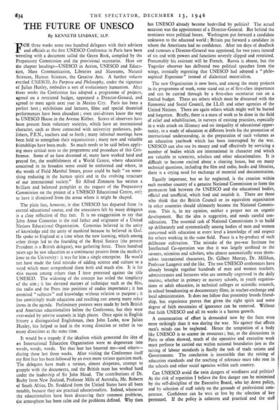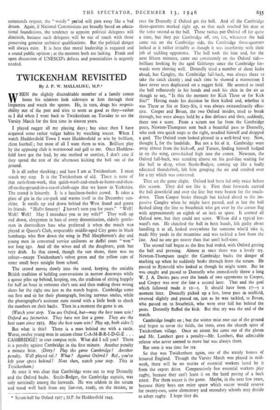THE FUTURE OF UNESCO
By KENNETH LINDSAY, M.P.
pOR three weeks some two hundred delegates with their advisers and officials at the first UNESCO Conference in Paris have been wrestling with a document called the Green Book, compiled by the Preparatory Commission and the provisional secretariat. Here are the chapter headings—UNESCO in Action, UNESCO and Educa- tion, Mass Communication, Libraries and Museums, Natural Sciences, Human Sciences, the Creative Arts. A further volume entitled UNESCO, Its Purpose and Philosophy, under the signature of Julian Huxley, embodies a sort of evolutionary humanism. After three weeks the Conference has adopted a programme of projects, agreed on a restricted budget, appointed a Director-General, and agreed to meet again next year in Mexico City. Paris has been a perfect host ; exhibitions and lectures, films and special theatrical performances have been abundant ; even taxi-drivers know the way to UNESCO House in the Avenue Kleber. Scores of observers have been present from voluntary societies, which have an international character, such as those connected with university professors, pub- lishers, P.E.N., teachers and so forth ; many informal meetings have been held to strengthen their organisations ; many new and valuable friendships have been made. So much needs to be said before apply- ing more critical tests to the programme and procedure of this Con- ference. Some of us have dreamed of, many have worked hard and prayed for, the establishment of a World Centre, where education conceived in its broadest sense could be enthroned and where, in the words of Field Marshal Smuts, peace could be built " on some- thing enduring in the human spirit and in the evolving structure of our international society." Sir Alfred Zimmern has written a brilliant and balanced pamphlet at the request of the Preparatory Commission on the project of a UNESCO Educational Centre, only to have it dismissed from the arena where it might be shaped.
The plain fact, however, is that UNESCO has departed from its central educational source, and the uneasiness felt by many delegates is a clear reflection of that fact. It is no exaggeration to say that John Amor Comenius is the real father and originator of a United Nations Educational Organisation. Comenius believed in the unity of knowledge and the unity of mankind because he believed in God. He spoke to England at a time when the new learning, which among other things led to the founding of the Royal Society (the present President is a British delegate), was gathering force. Three hundred years ago he saw education as a continuous process from the mother's knee to the University: it was for him a single enterprise. He would not have made the fatal mistake of adding science and culture to a word which must comprehend them both and much else. It is for this reason among others than I have protested against the title UNESCO. The widening of the concept has soiled the simplicity of the aim ; it has elevated matters of technique such as the film, the radio and the Press into positions of undue importance ; it has atomised " subjects " and knowledge without relation to purpose ; it has unwittingly made education and teaching one among many other items in the agenda. Preliminary protests were made by both British end American educationalists before the Conference, but they were over-ruled by unwise counsels in high places. Once again in English history a distinguished Englishman, then John Locke, now Julian Huxley, has helped to lead in the wrong direction or rather in too many directions at the same time.
It would be a tragedy if the idealism which generated the idea of an International Education Organisation were to degenerate into words, words, words. Yet that fear has haunted me—and others— during these last three weeks. After visiting the Conference itself my first fear has been followed by an even more serious question mark. The delegates have made a serious, almost desperate, attempt to grapple with the documents, and the British team has worked hard under the leadership of Sir John Maud. The contributions of Dr. Beeby from New Zealand, Professor Mills of Australia, Mr. Roberts of South Africa, Dr. Stoddard from the United States have all been notable, because they are practical educationalists. Indeed, whenever the educationalists have been discussing their common problems, the atmosphere has been calm and the problems defined. Why then has UNESCO already become bedevilled by politics? The actual occasion was the appointment of a Director-General. But behind the nominees were political forces. Washington put forward a candidate unknown to the educated world ; Britain put forward a candidate in whom the Americans had no confidence. After ten days of deadlock and rumours a Director-General was appointed, for two years instead of six and with powers and functions severely clipped and restricted. Presumably his assistant will be French. Russia is absent, but the Yugoslav observer has delivered two political speeches from the wings, ironically regretting that UNESCO had adopted a " philo- sophical Esperanto " instead of dialectical materialism.
The new Organisation is now born, and among the many projects in its programme of work, some stand out as of first-class importance and can be carried through by a first-class secretariat run on a limited budget. There are others which must be discussed with the Economic and Social Council, the I.L.O. and other agencies of the United Nations. There are again others which might well be buried and forgotten. Briefly, there is a mass of work to be done in the field of relief and rehabilitation, in surveys of existing practices, especially in a wide attack on illiteracy and on inequality of educational oppor- tunity, in a study of education at different levels for the promotion of international understanding, in the preparation of such volumes as an education yearbook which has been interrupted by the war. UNESCO can also use its money and staff effectively by servicing a number of bodies which are international •in character and which are valuable to scientists, scholars and other educationalists. It is difficult to become excited about a clearing house, but on many technical questions, including the film and radio, books and libraries, there is a crying need for exchange of material and documentation.
Equally important, but so far neglected, is the creation within each member country of a genuine National Commission to form the permanent link between the UNESCO and the educational bodies, official and unofficial, which feed and nourish it. There are those who think that the British Council or its equivalent organisation in other countries should ultimately become the National Commis- sion. This is, in my opinion, neither a proper nor an organic development. But the idea is suggestive, and needs careful con- sideration. The essential task of National Commissions is to build up deliberately and systematically among bodies of men and women concerned with education at every level a knowledge of and respect for others working in the same field. Peace is a by-product of such deliberate cultivation. The mistake of the pre-war Institute for Intellectual Co-operation was that it was largely confined to the savants, scientists and scholars, who almost automatically were them- selves international characters, Dr. Gilbert Murray, Dr. Millikan, Professor Langevir and the like. The two UNESCO conferences have already brought together hundreds of men and women teachers, administrators and lecturers who are normally engrossed in the daily routine, whether in primary or nursery schools, in youth organisa- tions or adult education, in technical colleges or scientific research, in school broadcasting or documentary films, in teacher-exchange and local administration. It does not follow that proximity breeds friend- ship, but experience proves that given the right spirit and some degree of faith mountains of ignorance can be removed. Without that faith UNESCO and all its works is a barren growth.
A concentration of effort is demanded now by the facts even more strikingly than it was during the war. No agency that affects men's minds can be neglected. Hence the temptation of a body like UNESCO is to scatter its resources ; but, as the discussions in Paris so often showed, much of the operative and executive work must perforce be carried out within national boundaries just as the raising of labour standards is finally the task of trade unions and Governments. The conclusion is irresistible that the raising of education standards and the teaching of tolerance must take root in the schools and other social agencies within each country.
Can UNESCO avoid the twin dangers of wordiness and politics? At the risk of repetition I believe the first danger can be minimised by the self-discipline of the Executive Board, who lay down policy, and by selection of staff solely on the grounds of professional com- petence. Confidence can be won or lost by the selection of key personnel. If the policy is coherent and practical and the staff
commands respect, the "wordy " period will pass away like a had dream. Again, if National Commissions are broadly based on educa- tional foundations, the tendency to appoint political delegates will diminish, because such delegates will be out of touch with those possessing genuine technical qualifications. But the political danger will always exist. It is here that moral leadership is required and a sound public opinion ; at the moment both are lacking. Frank and open discussion of UNESCO's defects and potentialities is urgently needed.



































 Previous page
Previous page